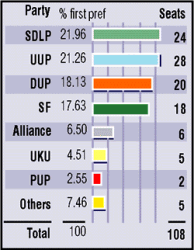
Though failing to
decommission a single weapon (one of the preconditions of the peace deal),
the IRA sticks to the peace agreement even after last week's elections
in the province. But if the IRA and the other paramilitary groups do not
start abandoning their arms, the Unionists will be even more sceptical
of a sustained solution or a democratic new government.
The election results
give the Protestants in the Northern Ireland Assembly a majority, to be
sure, but it is by far not as comfortable as the population proportion
suggests (two thirds to one third in favour of the Protestants).
The two major Catholic
parties, the SDLP and Sinn Fein, have gained 42 seats and the two major
Protestant parties, the Ulster Unionists and Ian Paisley's Democratic Unionists,
have won 48 seats. Among David Trimble's UUP, however, are three or four
dissidents of the peace deal. Trimble will become the province's first
Prime Minister and John Hume from the SDLP his deputy.
The Ulster Democratic
Party, the Ulster Freedom Fighters' political wing, has not won a single
seat which might result in the UFF resuming violence. Many of the 18 elected
Sinn Fein candidates are former IRA terrorists which might also add to
tensions at least in the assembly. The fact that the SDLP won more first-preference
votes than its rival, the UUP, does not contribute to smooth coalition
negotiations, either. The weeks and months ahead will be a very interesting
time concerning Northern Ireland's future. |

